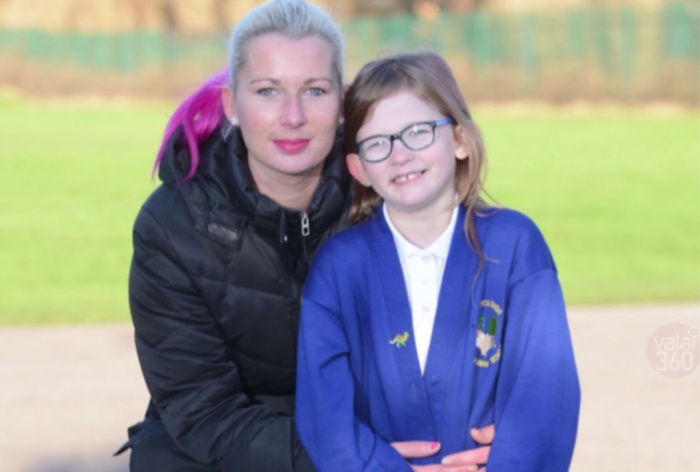Imagine walking away from a car accident without a scratch, while everyone around you is screaming in horror. That’s Olivia Farnsworth’s reality. Dubbed the “Bionic Teen,” this young girl from the UK doesn’t feel pain, hunger, or fatigue due to a rare genetic condition known as chromosome 6 deletion. Her story is not just mind-blowing; it’s a reminder of how little we truly understand about the human body.
In this article, we’ll dive into Olivia’s journey, explore the science behind her condition, and reflect on how her story has captivated the world. It’s a story of resilience, curiosity, and perhaps, a little bit of superhuman mystery.
Who Is Olivia Farnsworth?
Olivia Farnsworth was just seven years old when she was hit by a car and dragged down the street. If you’re wincing at the thought, you’d be even more shocked to learn that Olivia got up afterward, calmly brushed herself off, and walked away. Her mother, Niki Trepak, was understandably horrified. “It was horrendous,” she said, recalling the event. “I was screaming, and my other children were screaming, but Olivia Farnsworth just got up and started walking back to me. She didn’t even complain.”
The doctors were baffled. How could a young girl, who had just been through such a terrifying accident, escape without major injuries? Olivia Farnsworth genetic condition was already known at the time, but this incident made the world take notice of what it means to live without pain, hunger, or fatigue.

Chromosome 6 Deletion: The Rare Condition
Olivia’s condition, chromosome 6 deletion, is so rare that she might be the only person in the world with her specific set of symptoms. According to the National Organisation for Rare Disorders, chromosome 6 deletion occurs when a part of chromosome 6 is missing. This can result in a wide variety of symptoms, including developmental delays, intellectual disabilities, behavioral issues, and unique facial features.
But Olivia Farnsworth case is different. Not only does she exhibit many of the typical symptoms of chromosome 6 deletion, but she also lacks the basic human sensations of pain, hunger, and fatigue. Doctors are still puzzled by how this condition affects her brain and nervous system, and there are ongoing studies to understand why she feels no physical discomfort.
What Is Life Like Without Pain?
Pain is something we all try to avoid. But imagine never feeling pain at all—no matter what happens to you. Olivia Farnsworth case isn’t just about surviving a car accident. There are countless other instances where her lack of pain response has left her parents in disbelief.
One such incident involved Olivia Farnsworth falling and ripping her lip. Most of us would rush to the hospital, clutching our face in agony. But Olivia? She didn’t even flinch. When her mother arrived, she found Olivia with her bottom teeth stuck through her lip, not even crying. “Olivia Farnsworth had to have plastic surgery, and when the surgeon was examining her, he was pulling her lip and she wasn’t even reacting. He told me something wasn’t right,” Niki recalled.
It’s a chilling thought—because while we think of pain as a nuisance, it’s also a warning system for our bodies. Without pain, Olivia Farnsworth life is a constant risk of serious injuries, infections, or worse. Her mother once noted, “She has no sense of danger.”
No Hunger? No Problem.
Olivia Farnsworth condition doesn’t just affect her pain receptors. She also doesn’t feel hunger—a trait that sounds like a dream to some but is actually a serious challenge. Most of us live by the clock, planning our meals around the gnawing feeling in our stomachs. Olivia, on the other hand, has no natural desire to eat.
Her mother explained how, from an early age, Olivia started rejecting milk and refusing food. “When she was nine months old, she started rejecting my milk. Since then, she’s never really liked food. She eats at school because everyone else does, but she doesn’t really need it. She’s almost conditioned to eat.”
At home, Olivia often goes through phases of eating the same thing for months, then suddenly dropping that food. Once, she lived on butter sandwiches. Another time, she ate nothing but milkshakes. It’s not that she’s picky—it’s that her body doesn’t crave food like ours do. Imagine having to remind yourself to eat simply because it’s what keeps you alive, not because you feel hungry.
The Challenges of Insomnia
And if that wasn’t enough, Olivia doesn’t get tired either. Sleep is optional for her—something most of us would kill for during a long workweek. But as much as we fantasize about never needing sleep, the reality is much more complex.
Olivia survived on just two hours of sleep a night as a toddler. While most children need naps and regular sleep patterns, Olivia simply didn’t. Eventually, her mother had to resort to medication to get her to rest. Imagine the toll this takes on the family. Her mother, constantly on edge, unable to catch a break. Her siblings, having to adjust to a sister who doesn’t operate on the same sleep-wake cycle.
Lack of sleep might seem like a blessing, but sleep is crucial for brain development, emotional regulation, and overall health. For Olivia, the inability to feel tired means her family must stay vigilant around the clock.

Living With Superhuman Traits
The media may have branded Olivia Farnsworth as the “Bionic Teen,” but life for her and her family is far from the futuristic fantasy that nickname implies. Without pain, hunger, or fatigue, Olivia faces a unique set of challenges that require constant attention and care. From her mother’s perspective, it’s a daily balancing act of managing a condition that even the doctors don’t fully understand.
While Olivia’s story has been covered in news outlets, it raises deeper questions about how we define what it means to be human. Pain, hunger, and fatigue are uncomfortable experiences, sure, but they’re also signals that help keep us safe and healthy. Olivia lives without these basic systems of survival, relying instead on her family and doctors to watch for danger.
What’s Next for Olivia?
As of now, Olivia Farnsworth continues to be a medical mystery. Doctors are still studying her condition, trying to uncover what causes her unique set of symptoms. But one thing is clear: Olivia’s story has brought attention to the complexities of rare genetic disorders like chromosome 6 deletion.
Researchers are hopeful that studying her condition will shed light on new treatments for pain management, sleep disorders, and even appetite regulation. Who knows? Olivia’s rare disorder might help us understand more about how the human body works, potentially leading to breakthroughs that could benefit millions.
The Importance of Awareness
Olivia’s story serves as a reminder that we need to continue researching rare genetic conditions and offering support to families who are affected by them. Awareness campaigns, like those run by the National Organisation for Rare Disorders, help connect families with resources and medical experts. Sharing Olivia’s journey not only educates others about chromosome 6 deletion but also builds empathy for those living with invisible challenges.
If Olivia’s story has inspired you, consider learning more about rare genetic conditions and supporting organizations that fund research. Every donation or share on social media helps raise awareness. Let’s bring attention to the families who need our help, and encourage further study of rare genetic conditions like chromosome 6 deletion. Together, we can help unravel the mysteries of the human body—one story at a time.

